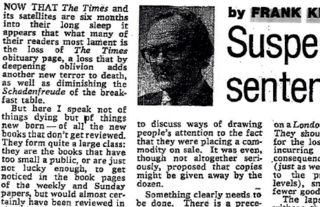Frank Kermode and the origins of the LRB
The Editors
In the introduction to an anthology of LRB pieces published in 2004, Frank Kermode wrote of the paper’s origins:
The Times and its satellites, most relevantly the TLS, had disappeared months beforehand – might, for all we knew, have ceased to exist – but time went by and nobody perceived its absence as an opportunity to replace it… The notion that a new journal might occupy the gap left by the TLS finally took hold.
He didn’t mention that the notion was first put forward in a piece he wrote for the Observer in June 1979, reproduced here.
‘Now that The Times and its satellites are six months into their long sleep it appears that what many of their readers most lament is the loss of The Times obituary page, a loss that by deepening oblivion adds another new terror to death, as well as diminishing the Schadenfreude of the breakfast table.
But here I speak not of things dying but of things new born – of all the new books that don’t get reviewed. They form quite a large class: they are the books that have too small a public, or are just not lucky enough, to get noticed in the book pages of the weekly and Sunday papers, but would almost certainly have been reviewed in the Times Literary and the Times Higher Educational Supplements. Their best hope is that more specialist journals will take a look at them a year or two hence, when nobody will buy them.
Authors and publishers of forthcoming books are now much exercised about this problem, and part of my reason for meditating upon it is precisely that I have a book due out soon. Unlike most authors I find that the date of publication invariably coincides with the moment when my loathing for my book reaches its maximum intensity; I should prefer everybody to ignore it, and this time it seems probable that I shall get what I want. But real writers probably do not have, and in any case couldn’t afford, this kind of stage-fright.
Nor can publishers. Mine came to see me the other day to discuss ways of drawing people’s attention to the fact that they were placing a commodity on sale. It was even, though not altogether seriously, proposed that copies might be given away by the dozen.
Something clearly needs to be done. There is a precedent: the American newspaper strike of 1963 brought forth the New York Review of Books, a charismatic venture, started with a smallish loan; it is now a profitable institution. Yet even NYRB is of less vital importance, especially here, than TLS. Its coverage is less complete; and although some of its reviews have great authority and timeliness, it cannot systematically cater for minority interests.
Since the need is even greater, why can’t something of the sort be done here? The answer is presumably that nobody would dream of putting up the money. Yet anybody who knows anything about the British book world could rattle off a list of publishers who, given an admittedly improbable measure of enlightenment in their attitude to costing, could justify spending quite a lot of money on a London Review of Books. They should allow not only for the losses they are now incurring but their future consequences: higher prices (just as we were getting used to the present monstrous levels), smaller print runs, fewer good books.
The lapse of six months without the slightest visible stir of enterprise is very depressing. The idea of doing something about it must surely by now have crossed somebody’s mind: Lord Goodman’s? Brigid Brophy’s and Maureen Duffy’s? (They can do anything.) Has anybody tried to persuade Stephen Hearst that Radio 3, the descendant, for all its sad mutations, of the Third Programme, might at this time have remembered the copious book reviews of its ancestor, and found space for some of its own, even at the cost of postponing its literary chat-shows and not very urgent short stories?
But perhaps energy and imagination are as hard to come by, these days, as money. Some years back I was chairman of the Literature Panel of the Arts Council, and we had occasional meetings with publishers and journalists to consider how we could best be of service. The question of reviewing was one that often came up. There wasn’t enough of it, even with the contributions of Times Newspapers Ltd. It was felt, and rightly, that fiction was particularly under-reviewed, four novels, perhaps, in eight hundred words, and goodness knew how many of his batch the reviewer had simply left out altogether. More space was needed; and space for book reviews often varies directly with the volume of available advertising, so that in a thin week even more books would go unnoticed to the knacker’s yard in Chancery Lane.
All agreed about this state of affairs; but the suggestion that reviewing space (not specific reviews, of course) should be subsidised was rejected as dangerous to our liberties, though why it was thought to be more dangerous than advertising I don’t know. Arts Council money has been used in ways I regard as much less happy and useful that those I suggested: but even if the world could be seen to want it I don’t think the Council is about to subsidise a temporary TLS.
And as authors (always excepting Brophy-Duffy) lack the power to act, the only remedy for our present evil rests with the publishers: presumably they can’t countenance for much longer a situation in which so few of the books addressed to the serious reading public have much hope of being reviewed or discussed.’
